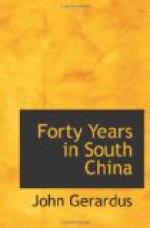city and fled to the house of some friends in the
suburbs near the river-side. By my letter of
May 19th, it will be seen that Amoy was attacked by
the insurgents on the morning (May 18th), after they
entered the city of Chiangchiu. The insurgents
are members of a secret society. For very many
years there has existed in this region a society by
the name of ‘Thian-te-hoe,’ Heaven and
Earth Society. This is the name by which the
members designate their society. But as the members
are generally provided with knives or small swords,
the society is designated by the people as ‘Sio-to-hoe,’
Small Sword Society. The professed object of this
society has been the overthrow of the present Tartar
dynasty. Between this and Chiangchiu the members
of this society are very numerous. After the
breaking out of the insurrection at Hai-teng, and Chioh-be
(cities fifteen and eighteen miles from Amoy, half
way to Chiangchiu), the whole populace appeared to
sympathize with the movement. Large bodies of
the insurgents moved up the river to Chiangchiu, others
came down the river to Amoy. At the same time
there was a rising of the insurgents at Tong-an and
An-khoe, districts to the north of Amoy. At the
first outbreak the officials and soldiers fled.
The people of Amoy have been in continual excitement
and fear. They are afraid to engage in business.
On Sabbath morning we went to our chapels as usual.
Shortly after commencing services, news came that
a fleet of war junks under the command of the Admiral
was anchoring a short distance from the city.
Soon the whole city was in commotion. About noon
a detachment of a thousand soldiers was landed from
the junks. They marched with very little opposition
through the town to the gates of the city. They
were attacked simultaneously by the insurgents from
within, and by those in ambush without. The insurgents
were victorious.
“By three o’clock in the afternoon the
city was comparatively quiet, and we repaired to our
church. Most of the church members were assembled.
Our church edifice is situated on the great thoroughfare
which had been the principal scene of excitement.
It was thought best to suspend the usual exercises,
to close the street doors, and hold if possible a quiet
prayer-meeting. It was a solemn time. The
‘confused noise’ of war had just been
heard, human blood had been flowing, the angry passions
of men were not yet calmed, and we knew not what the
end would be. We felt it a suitable time to draw
near to God and make Him our refuge. This afternoon
we received tidings from Chiangchiu. The evangelist
was arrested by twelve men, delivered to an official
and beheaded.”
“June 10, 1853. The state of affairs through
the whole of this region remains very unsettled.
The insurgents are endeavoring to regain possession
of the city of Chiangchiu. They have command of
the whole region, between this place and that city.
They still are in possession of Amoy. We are
almost daily expecting an attack by the government
authorities.




